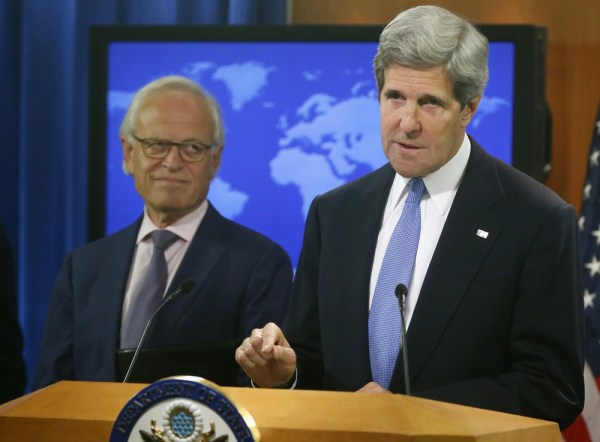
Charles Dharapak / AP
Secretary of State John Kerry, accompanied by former U.S. Ambassador to Israel Martin Indyk speaks at the State Department in Washington, Monday, July 29, 2013, where he announced that he Indyk will shepherd the Israeli-Palestinian peace talks.
By Andrew Rafferty, Staff Writer, NBC News
Secretary of State John Kerry on Monday appointed former U.S. ambassador to Israel Martin Indyk as the envoy tasked with shepherding the delicate Israeli-Palestinian peace talks set to begin later in the day.
Indyk?s appointment comes one day after the State Department announced talks ? which have been stalled for three years ? would resume between the two countries.
?I know the negotiations are going to be tough, but I also know that the consequences of not trying could be worse,? Kerry told reporters. ?To help the parties navigate the path to peace and to avoid its many pitfalls, we?ll be very fortunate to have on our team, on a day-to-day basis, working with the parties wherever they are negotiating, a seasoned American diplomat ? ambassador Martin Indyk.?
To take on his new role, the former diplomat gave up his post as director of the Foreign Policy Program at the Brookings Institution, a think tank in Washington, D.C. Before that he served in a variety of diplomatic roles during President Bill Clinton?s administration.
Indyk called the appointment a ?daunting and humbling challenge? but said he believes a lasting peace agreement is achievable.
But before negotiations resumed, leaders from both sides put forward clashing views over what a final agreement needs to look like. Negotiations in 2010 broke down over Israel?s settlement of occupied land where Palestinians seek a state.
Previous attempts to resolve the decades-old conflict had sought to ward off deadlock and the risk of knock-on violence by tackling easier disputes first and deferring the most emotional ones like the fate of Jerusalem and Palestinian refugees.
This time "all of the issues that are at the core of a permanent accord will be negotiated simultaneously," Silvan Shalom, a member of Israeli Prime Minister Benjamin Netayahu's cabinet and rightist Likud party, told Israel's Army Radio.
The Palestinians, with international backing, want their future state to have borders approximating the boundaries of the West Bank, adjacent East Jerusalem and the Gaza Strip before Israel captured them in the 1967 Middle East war.
Yasser Abed Rabbo, a top official in Palestinian President Mahmoud Abbas's umbrella Palestine Liberation Organisation, said the U.S. letter of invitation to the Washington talks had not specified which disputes were to be discussed.
But Abed Rabbo told Voice of Palestine radio the talks "will begin, in principle, on the issues of borders and security."
Netanyahu had resisted Abbas's calls to accept the 1967 border formula before talks resumed. Shalom said that the Israeli position would help keep the talks, which are slated to last nine months, comprehensive.
"Had the matter of borders and territory been given over, what incentive would they (Palestinians) have had to make concessions on the matter of refugees or Jerusalem?" Shalom asked.
Israel deems all of Jerusalem its capital - a status rejected internationally - and wants to keep West Bank settlement blocs under any peace accord. It quit Gaza in 2005 and that enclave is now ruled by Hamas Islamists hostile to the Jewish state and opposed to Abbas's peace strategy.
Palestinian refugees from the 1948 war at Israel's founding, along with millions of their descendants, claim the right to return to their original homes in what is now Israel. The Israelis rule that out as demographic suicide, saying the refugees should resettle in a future Palestine or elsewhere.
Netanyahu says any peace accord must safeguard Israel, which has often clashed with Hamas in Gaza and fears the Islamist movement could gain ground in the West Bank. Kerry has also described Israel's security as ?paramount.?
Abed Rabbo said Israel and the United States had been conferring about security without including the Palestinians.
"This is a big shortcoming in the Israeli and the American behavior because they are not discussing their bilateral security, they are discussing a central and a fundamental issue of ours and it concerns our future as a whole," he said.
After months of intensive and discreet mediation, Kerry announced on July 19 in Amman, Jordan, that the parties had laid the groundwork to resume negotiations on the so-called "final status" issues that must be resolved to end the dispute.
"The meetings in Washington will mark the beginning of these talks," Kerry spokeswoman Jen Psaki said. "They will serve as an opportunity to develop a procedural work plan for how the parties can proceed with the negotiations in the coming months."
In what it dubbed a goodwill gesture required to restart diplomacy, the Israeli cabinet on Sunday approved the release of 104 long-serving Palestinian security prisoners in stages. Thousands more Palestinians remain in Israeli jails.
Still, Indyk, who said he has believed a peace agreement is achievable since his time studying in the Middle East nearly 40 years ago, remained optimistic.
?I look forward with great excitement?to do our best to achieve President Obama?s vision of two states, living side-by-side in peace and security,? he said.
Reuters contributed to this report.
Related:
Tropical Storm Isaac amber portwood Phyllis Diller Darla Moore newsweek Tony Scott UFC 151
No comments:
Post a Comment
Note: Only a member of this blog may post a comment.